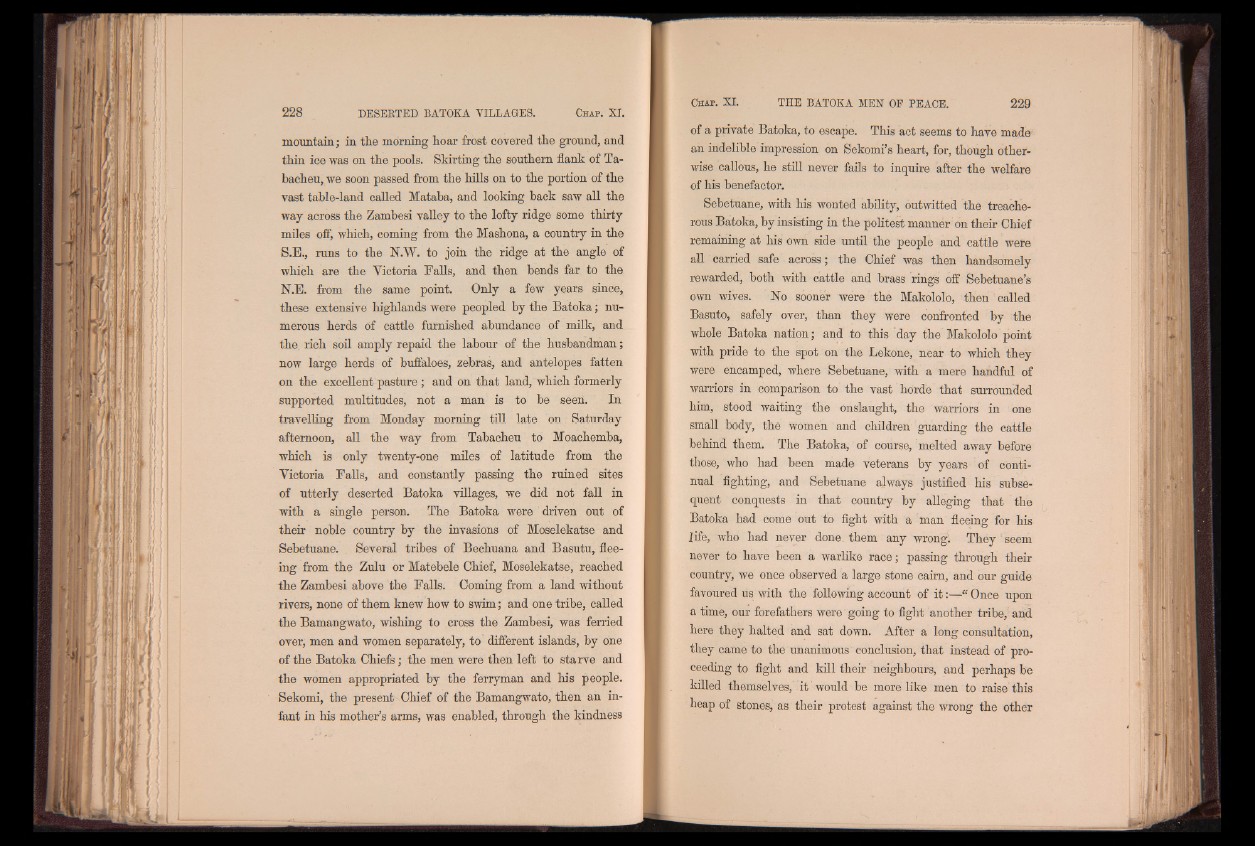
mountain; in the morning hoar frost covered the ground, and
thin ice was on the pools. Skirting the southern flank of Ta-
bacheu, we soon passed from the hills on to the portion of the
vast table-land called Mataba, and looking back saw all the
way across the Zambesi valley to the lofty ridge some thirty
miles off, which, coming from the Mashona, a country in the
S.E., runs to the N.W. to join the ridge at the angle of
which are the Victoria Falls, and then bends far to the
N.E. from the same point. Only a few years since,
these extensive highlands were peopled by the Batoka; numerous
herds of cattle furnished abundance of milk, and
the rich soil amply repaid the labour of the husbandman;
now large herds of buffaloes, zebras, and antelopes fatten
on the excellent pasture; and on that land, which formerly
supported multitudes, not a man is to be seen. In
travelling from Monday morning till late on Saturday
afternoon, all the way from Tabacheu to Moachemba,
which is only twenty-one miles of latitude from the
Victoria Falls, and constantly passing the ruined sites
of utterly deserted Batoka villages, we did not fall in
with a single person. The Batoka were driven out of
their noble country by the invasions of Moselekatse and
Sebetuane. Several tribes of Bechuana and Basutu, fleeing
from the Zulu or Matebele Chief, Moselekatse, reached
the Zambesi above the Falls. Coming from a land without
rivers, none of them knew how to swim; and one tribe, called
the Bamangwato, wishing to cross the Zambesi, was ferried
over, men and women separately, to different islands, by one
of the Batoka Chiefs; the men were then left to starve and
the women appropriated by the ferryman and his people.
Sekomi, the present Chief of the Bamangwato, then an infant
in his mother’s arms, was enabled, through the kindness
of a private Batoka, to escape. This act seems to have made
an indelible impression on Sekomi’s heart, for, though otherwise
callous, he still never fails to inquire after the welfare
of his benefactor.
Sebetuane, with his wonted ability, outwitted the treacherous
Batoka, by insisting in the politest manner on their Chief
remaining at his own side until the people and cattle were
all carried safe across; the Chief was then handsomely
rewarded, both with cattle and brass rings off Sebetuane’s
own wives. No sooner were the Makololo, then called
Basuto, safely over, than they were confronted by the
whole Batoka nation; and to this day the Makololo point
with pride to the spot on the Lekone, near to which they
were encamped, where Sebetuane, with a mere handful of
warriors in comparison to the vast horde that surrounded
him, stood waiting the onslaught, the warriors in one
small body, the women and children guarding the cattle
behind them. The Batoka, of course, melted away before
those, who had been made veterans by years of continual
fighting, and Sebetuane always justified his subsequent
conquests in that country by alleging that the
Batoka had come out to fight with a man fleeing for his
life, who had never done, them any wrong! They seem
never to have been a warlike race; passing through their
country, we once observed a large stone cairn, and our guide
favoured us with the following account of it Once upon
a time, our forefathers were going to fight another tribe, and
here they halted and sat down. After a long consultation,
they came to the unanimous conclusion, that instead of proceeding
to fight and kill their neighbours, and perhaps be
killed themselves, it would be more like men to raise this
heap of stones, as their protest against the wrong the other